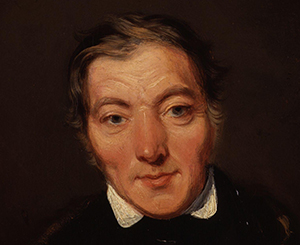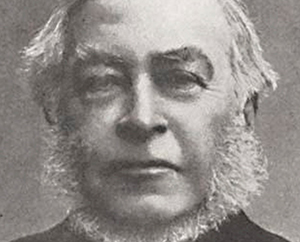ON THIS DAY
Published in Issue 6 (November/December 2020), News, Volume 28BY AODHÁN CREALEY
NOVEMBER
07/1831

Above: Robert Owen, whose ideas inspired the Ralahine Agricultural and Manufacturing Co-operative Association.
The Ralahine Agricultural and Manufacturing Co-operative Association was launched by John Scott Vandeleur on his 618-acre estate near Bunratty, Co. Clare. Inspired by Robert Owen (1771–1858), the pioneer of the co-operative movement, Vandeleur hoped to discourage his tenants from joining agrarian secret societies, to encourage them to raise common capital—so that they could eventually purchase the estate—and to promote protection ‘against the evils of poverty, sickness, infirmity, and old age, the attainment of a greater share of the comforts of life than the working class now possess, the mental and moral improvement of the adult members and the education of their children’. Supervised by Englishman E.T. Craig, a devoted Owenite, the tenants—seven married couples along with their children, who attended a non-denominational community school, and 21 single men—elected a committee twice a year and instead of money used ‘labour notes’, which could be used in community stores. Marking their progressive outlook, they were the first in Ireland to use a reaping machine. As Craig himself wrote:
‘The transformation of conditions seemed a mystery to many. Social science was more successful than military force. Socialism could induce poor, ignorant Irish peasants to live in peace and harmony with each other. In their individualism, every man was for himself at the expense of every other person. Now each found his interest promoted by promoting the comfort and happiness of all around him.’
The spanner in the works, however, proved to be the landlord himself. An inveterate gambler, Vandeleur’s debts ran out of control just two years later and his creditors moved in. They seized the estate and sold the entire assets of the co-operative.
01/1920
Kevin Barry (18), IRA Volunteer, was hanged in Mountjoy Jail for his role in an attack on a British army unit in September 1919 in which three soldiers were killed.
James Daly (22) of C Company, 1st Battalion, Connaught Rangers, and a member of the IRB, quartered in Jullundur, Punjab, was executed by firing squad for mutiny in June of that year.
09/1990
Mary Robinson (46), the Labour Party nominee, was installed as the seventh president of Ireland.
09/1970
General Charles de Gaulle (79), president of France (1958–69) and great-grandson of Marie Angelique McCartan from County Down, died.
14/1920
Fr Michael Griffin from Barna, Co. Galway, was abducted from his home by Auxiliaries. His body, with a single gunshot wound to the head, was later found in a shallow grave.
21/1920
Bloody Sunday in Dublin. Fourteen British army officers, three IRA Volunteers and thirteen civilians were killed in three separate incidents, the bloodiest day in the bloodiest month of the War of Independence.
28/1920
General Tom Barry’s Cork No. 3 (West Cork) Brigade wiped out an eighteen-man Auxiliary patrol at Kilmichael, on the Macroom–Dunmanway road, Co. Cork.
30/1670
John Toland, deist and writer on political philosophy and philosophy of religion whose best-known work, Christianity not mysterious (1696), was considered atheistic and subversive by the Irish parliament and ordered to be burnt by the hangman, born in Inishowen, Co. Donegal.
DECEMBER
02/1900

Above: Vere Foster, philanthropist and educationalist.
Vere Foster (81), philanthropist, died. Appalled by the misery he encountered on his first visit to Ireland in 1847, the worst year of the Famine, Foster used his considerable wealth to devote himself for over 60 years to charitable causes. During the Famine (1845–9) he made three trips to the United States along with emigrants on crowded and disease-ridden ‘coffin ships’, his reports on which, to various parliamentary committees, led to such reforming legislation as the Passengers’ Act (1851). Then he turned to education, paying for several hundred new parish schools and the refurbishment of thousands of others throughout the country, and devising and publishing a series of widely used instructional handbooks. In 1868, to address the miserable circumstances of teachers, he founded what became the Irish National Teachers’ Organisation. In 1879, when famine threatened again, he assisted the emigration of some 25,000 young women to the United States and the British colonies. He spent the last 30 years of his life living in an attic on Great Victoria Street, Belfast, and died in virtual penury, having spent a fortune of c. £120,000 over his lifetime on charitable causes. There were less than a dozen at his funeral to the City Cemetery on the Falls Road. A largely forgotten figure nowadays, he was given some recognition by his adopted city in 2007 when a cross-community medical practice with a surgery on South Belfast’s loyalist Sandy Row and a sister surgery on the nationalist Falls Road was renamed the Vere Foster Medical Practice ‘in honour of a man who devoted his life to the social improvement of the Irish poor irrespective of creed or politics’.
08/1980
Taoiseach Charles J. Haughey and British Prime Minister Margaret Thatcher held a summit meeting in Dublin Castle, after which they agreed to examine ‘the totality of relationships’ between the UK and Ireland and to establish an Anglo-Irish Committee.
10/1920
Martial law was proclaimed in counties Cork, Kerry, Limerick and Tipperary.
11/1920
Following an IRA ambush near Victoria Barracks in Cork, Auxiliaries and Black and Tans went on the rampage, looting and setting fire to large parts of the city centre, including City Hall. Over five acres of property, valued at £20 million, were destroyed.
12/2000
With just five more weeks in office, US President Bill Clinton landed in Dublin on his third visit to Ireland. From there he proceeded to an open-air rally in Dundalk and then on to Belfast for talks with the political parties on the contentious issues of decommissioning and policing.
15/1920
Canon Thomas Magner and a local man, Tadhg Crowley, were shot dead by an Auxiliary officer in Dunmanway, West Cork.
15/1930
Edna O’Brien, novelist, most famous for her first, The country girls (1960), born in Tuamgraney, Co. Clare, the daughter of a farmer.
18/1980
The first H-Block hunger strike for the return of political status ended following the intervention of Cardinal Ó Fiaich.
23/1920
The Act for the Better Government of Ireland created the states of Northern Ireland (six counties) and Southern Ireland (26 counties)
23/1920
The Sinn Féin president, Éamon de Valera, returned to Ireland after an eighteen-month fund-raising tour of the United States.
25/1980
Percival Arland Ussher, writer, philosopher and Irish scholar who published the first translation of Brian Merriman’s The midnight court, died.
29/1170
Thomas Becket (c. 50), archbishop of Canterbury since 1162, was murdered in Canterbury Cathedral by four knights on the apparent orders of Henry II. He was canonised two years later by Pope Alexander III.
















